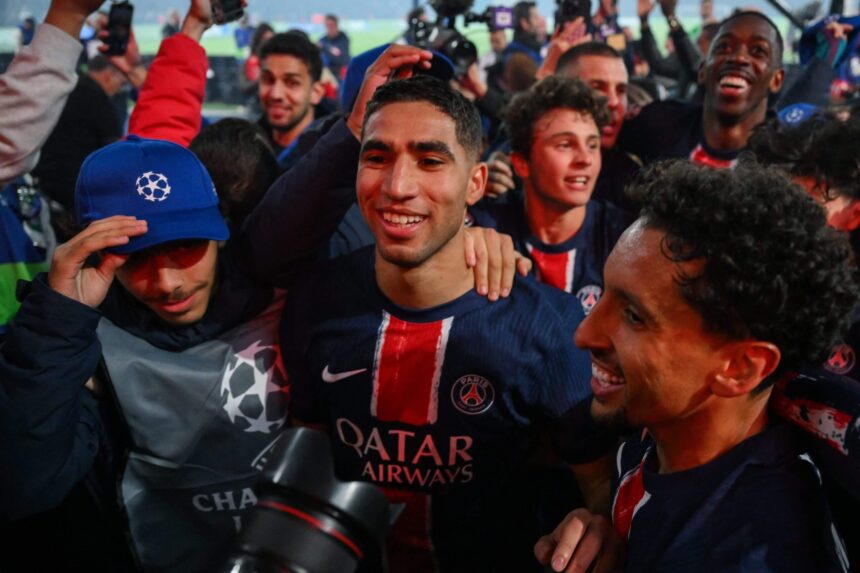There is a danger, when it comes to Paris Saint-Germain, of going overboard on their status as plucky outsiders and untested youngsters, in this increasingly impressive post-Kylian Mbappe era.
This is, after all, a club of staggering wealth who have dominated their domestic league to a downright tedious level over the past decade, who are capable of signing star players from Napoli, Milan and their final opponents Inter, amongst others. This is, more or less, the level they should be at. But it’s still difficult not to marvel at quite how complete PSG are, so soon after they were a side with some overwhelming strengths and quite pitiful weaknesses.
Advertisement
Which is not to say they are now perfect. At times they lack combination play in attack, they can be exposed in the right-back zone, and they have been indebted to goalkeeper Gianluigi Donnarumma at various points throughout their run to the final. But in terms of dominating and outplaying the opposition, PSG can do it in various ways. “They’re one of the best sides — if not the best side — in Europe,” said Arsenal manager Mikel Arteta after his side’s 2-1 second-leg defeat at the Parc des Princes. You would not have caught anyone saying that during the league stage of this competition, when PSG briefly seemed set for elimination.
In the knockout stage, however, they have been imperious in so many different ways. They have most regularly been celebrated for their pressing play, mainly as it is such a stark contrast from the style of the old PSG, when Mbappe, Lionel Messi and Neymar offered nothing without the ball. The current side’s pressing was most famously highlighted during Prince William’s slightly bizarre stint as a pundit on TNT Sports before ‘his’ Aston Villa side faced them. “Can we get around the press? Can we beat it?” he pondered. “So I’m thinking long ball a bit, I’m also thinking how are they going to get around the high press?”
It was a justified concern. PSG press as both an attacking and a defensive strategy. They had recorded the highest number of shot-ending high turnovers in the Champions League going into the semi-final stage, and away at the Emirates they prevented Arsenal from playing out so effectively that the Gunners’ most frequent pass combinations were the centre-backs knocking it around with David Raya.
But at other points, particularly in their win at Anfield in the last 16, PSG’s midfield has been more notable for its ability in possession. For all the focus on pressing, and there is plenty of tenacity and energy in this midfield, it should not be forgotten that Vitinha and Joao Neves are technical more than they are physical. At 5ft 8in (173cm) and 5ft 9in respectively, they are not exactly likely to overpower players such as Thomas Partey and Declan Rice. To focus solely on their work without possession overlooks their ability to knock quick passes around their opponents, teasing them out of position and then breaking suddenly, often rotating positions so the player who started the move deep in midfield is suddenly at the top.
Achraf Hakimi leads the PSG celebrations after the game (David Ramos/Getty Images)
In Fabian Ruiz, who smashed home their opening goal on Wednesday, they have the perfect symbol of all this: a physical player who is also a lovely, careful passer of the ball, a midfielder who can be both steady and spectacular. Although Rodri won the prize as Euro 2024’s best player, Ruiz probably outperformed him. He might taste continental success in Germany again next month when the final takes place in Munich. “He can deceive people,” said his manager Luis Enrique afterwards. “He’s tall but he can accelerate a lot. We have a lot of possession and we need players who can drift around a lot and go in behind. He also brings calm to the team.” His hybrid style is the perfect personification of Luis Enrique’s side.
Advertisement
On top of all this, PSG also offer a counter-attacking threat too. Khvicha Kvaratskhelia looks languid and then explodes past opponents. Desire Doue and Bradley Barcola are excellent at exploiting space. Sometimes their decision-making is questionable, and PSG offer more sophistication when Ousmane Dembele plays through the middle to offer both speed in behind and, a little more surprisingly, the capability to receive the ball between the lines. That quality proved crucial for his winner at both Liverpool and Arsenal in this Champions League campaign, linking play to prompt the attack, before also applying the finish. PSG will probably need that ability to drag Inter’s centre-backs out of position in the final.
And PSG can defend the box, too, both with their defenders and their goalkeeper. In Paris, Arsenal peppered them with crosses and an extraordinary number of Partey long throws. This seemed somewhat basic at times, but two of those throws created good chances within the first five minutes. And there, PSG had Donnarumma, who has been absolutely superb in the ties against both Liverpool and Arsenal. At times there has been a suspicion that the Italian’s distribution is not quite good enough, but he more than makes up for it with his shot-stopping ability. “The Champions League is won in the boxes,” said Arteta after the game. “He’s won the tie for them.”
Maybe you could say the same of Inter’s Yann Sommer the previous evening. These Champions League knockout games so often seem to be decided by fine margins, and by individual moments rather than by overall dominance. That has certainly been the case in these semi-finals, and while PSG do not have the combination play of Inter, or the aggressive defensive line of Barcelona, or the set-piece threat of Arsenal, they can probably beat you in more ways than any other side in Europe.
(Top photo: Lars Baron – UEFA via Getty Images)
